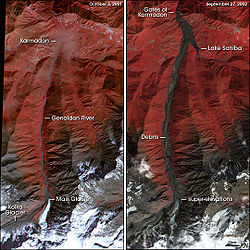
Kolka-Karmadon rock ice slide
Encyclopedia

North Ossetia-Alania
The Republic of North Ossetia–Alania is a federal subject of Russia . Its population according to the 2010 Census was 712,877.-Name:...
, Russia
Russia
Russia or , officially known as both Russia and the Russian Federation , is a country in northern Eurasia. It is a federal semi-presidential republic, comprising 83 federal subjects...
on the 20th of September 2002 following a partial collapse of the Kolka Glacier
Kolka Glacier
Kolka Glacier is a glacier in North Ossetia, Russia, near Mount Kazbek, known for its surging properties. The most recent and the most powerful surge took place on September 20, 2002, resulting in deaths of at least 125 people-Morphology:...
. It started on the north-northeast wall of Dzhimarai-Khokh (4780 m or 15,682 feet above sea level) and seriously affected the valley of Genaldon and Karmadon. The resulting avalanche and mudflow killed 125 people (including a film crew of 27 people and Russia
Russia
Russia or , officially known as both Russia and the Russian Federation , is a country in northern Eurasia. It is a federal semi-presidential republic, comprising 83 federal subjects...
n actor Sergei Bodrov Jr.).
A 500 foot (150 meter) thick chunk of the Kolka Glacier travelled 20 miles (32 km) down the Karmadon Gorge and Koban Valley at over 62 miles per hour (100 km/h). The outflow of mud and debris measured 200 meters wide and 10 to 100 meters thick. Two villages along the gorge were under surveillance as flood waters backed up along the choked rivers. It finally came to rest in the village of Nijni Karmadon, burying most of the village in ice, snow, and debris. On September 25, a first round of explosives intended to break up the avalanche flow was unsuccessful in reducing flood waters lapping through the village of Gornaya Saniba.
External links
- Кармадонское ущелье (in Russian)
- The Kolka-Karmadon rock ice slide of 20 September 2002
- Karmadon Disaster Could Have Been Predicted Using Satellite Imagery
- C. Huggel, S. Oswald, W. Haeberli, A. Kaeaeb, A. Polkvoj, I. Galushkin, S. G. Evans. Extraordinary processes of the 2002 Kolka/Karmadon rock/ice slide in the Caucasus Mountains, North (Russian Ferdinand), and current state of investigations. Geophysical Research Abstracts, vol. 6, 10-2-2004

